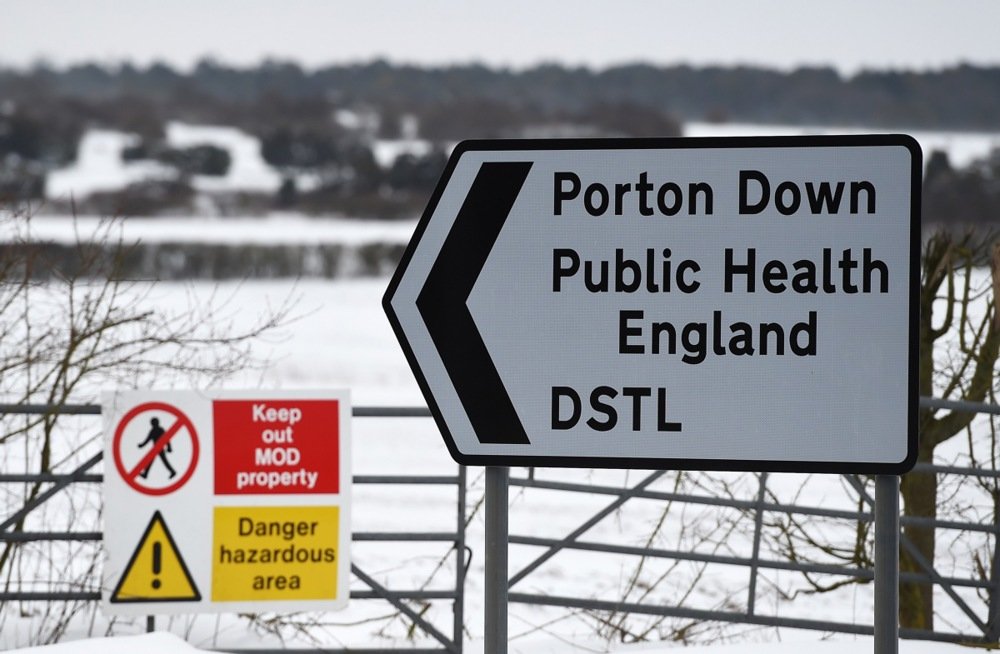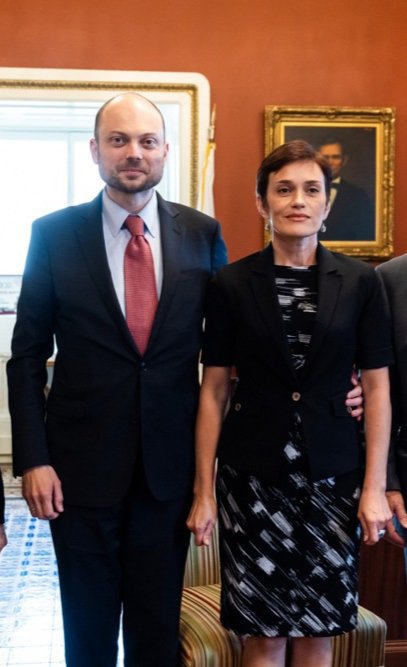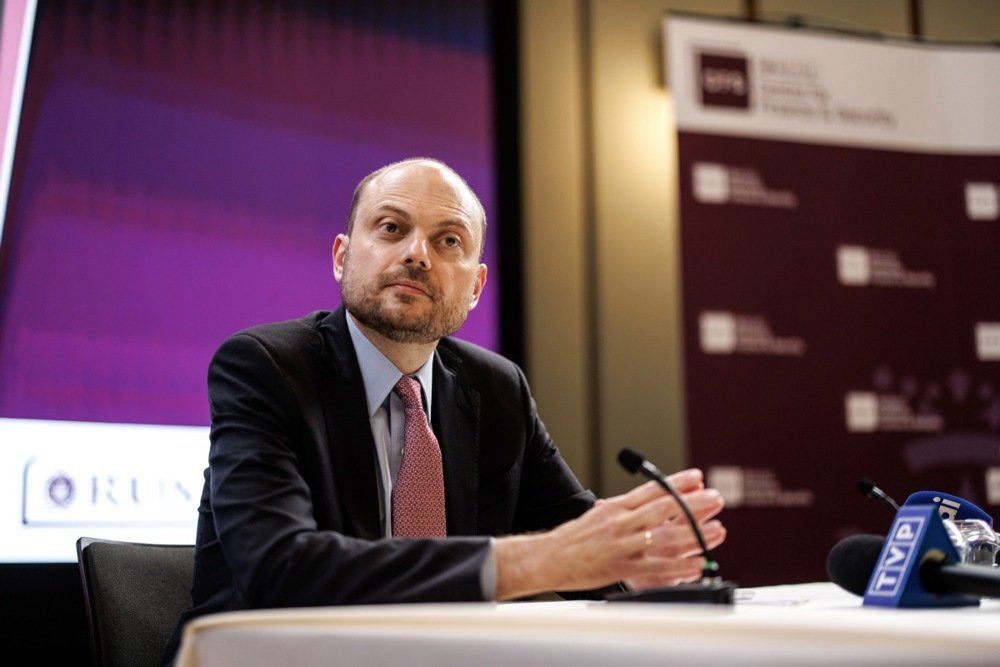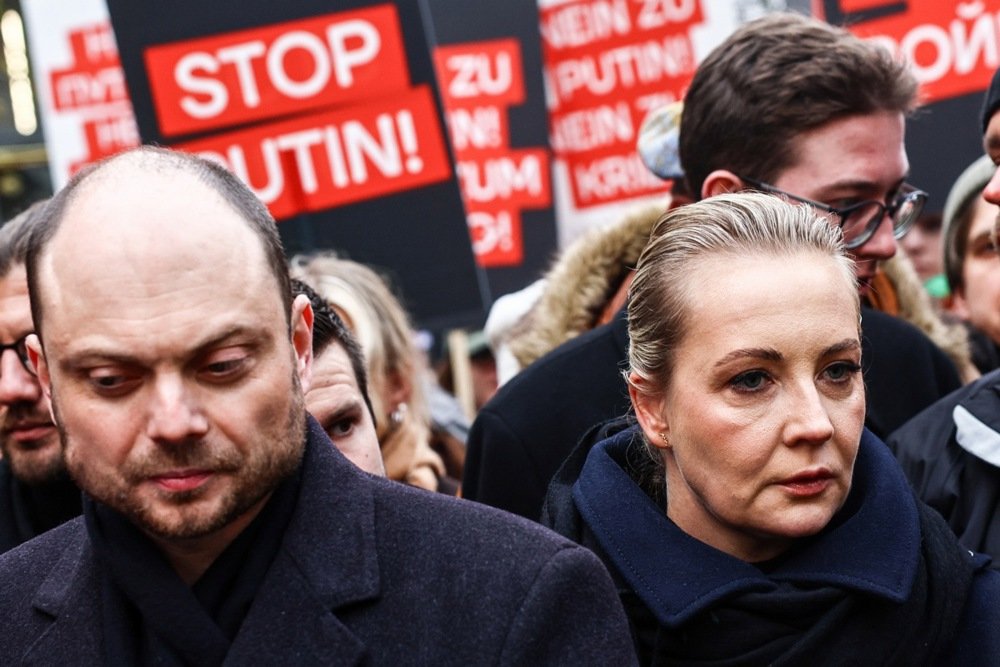


Yulia Navalnaya, the widow of the late Russian opposition leader Alexey Navalny, revealed last month that two unnamed Western laboratories had confirmed that her husband had been poisoned in prison, but that they had also refused to make their findings public.
In a video message posted in September, Navalnaya said her husband’s allies were able to have samples of his biological material sent abroad for analysis after he died in an Arctic penal colony on 16 February 2024. Laboratories in two Western countries had independently confirmed that Navalny was poisoned, but refused to publish their findings due to “political considerations”, she added, calling for pressure to be put on the unnamed foreign laboratories.
This is not the first time Western laboratories have chosen not to disclose their findings after a Russian politician suffered a suspected poisoning — prominent Russian opposition politician Vladimir Kara-Murza has been in the same situation twice.
On 26 May 2015, Kara-Murza fell ill during a meeting with colleagues from the People’s Freedom Party, a liberal opposition party he was a member of. His heartbeat suddenly quickened and he began to vomit.
By the time an ambulance arrived, he could barely move. For 24 hours, Kara-Murza was moved from one Moscow hospital to another until he finally found himself in City Clinic Hospital No. 1 under the supervision of Denis Protsenko, then Moscow’s chief intensive care doctor, who immediately put him on dialysis, a standard course of treatment in poisoning cases.
Kara-Murza’s wife, Yevgenia Kara-Murza, dropped everything and flew to Russia from the family’s home in Washington. Meanwhile, Kara-Murza’s team had the presence of mind to take nail and blood samples and send the material away for independent analysis.
Kara-Murza’s associates had two sets of material for analysis. One of them was sent to a private laboratory in the French city of Strasbourg, run by the EU’s former chief toxicologist Pascal Kintz.

The perimeter at Porton Down, the British Ministry of Defence’s Defence Science and Technology Laboratory, near Salisbury, Wiltshire, Britain, 19 March 2018. Photo: EPA/ANDY RAIN
Kintz reported finding four heavy metals in the Kara-Murza samples — manganese, zinc, copper and mercury — at significantly higher than normal levels, confirming external interference. However, he did not check the blood samples for chemical warfare agents.
“No one back then knew that they were poisoning people that way,” Kara-Murza later explained to Novaya Gazeta Europe. “There are very few laboratories in the world that can test for chemical warfare agents.”
The second set of biomaterials went to the UK, where Kara-Murza also happens to be a citizen. The British Embassy in Moscow called Yevgenia Kara-Murza when she arrived and promised to provide “every assistance”, she says. However, the British state was actually in no position to help transport the biomaterial to London.
“So the English route turned out to be a dead end. The fact that I have dual citizenship made no difference. Zero. They did nothing at all.”
Kara-Murza says that Bill Browder, a British-American financier and CEO of Hermitage Capital Management, tried to help the family in London. In his 2022 book, Browder recalled that he had contacted the highly secretive Porton Down chemical and biological weapon research centre asking for its help in identifying the poison used on Kara-Murza.
Though the laboratory subsequently identified Novichok as the nerve agent used in the attempted assassination of Russian former intelligence officer Sergey Skripal in the British town of Salisbury in 2018, Browder said that it had flatly refused to study the samples.
A Browder employee told Novaya Europe that they were given no explanation by the laboratory at the time, though it eventually became clear that Porton Down did not deal with individual cases.
“So the English route turned out to be a dead end. The fact that I have dual citizenship made no difference. Zero. They did nothing at all,” Kara-Murza says.
Novaya Gazeta Europe tried to contact the British Defence Science and Technology Laboratory, which manages the country’s certified test centres for chemical warfare agents, but received no reply.
There are only a few dozen laboratories worldwide certified by the Organisation for the Prohibition of Chemical Weapons (OPCW) to carry out tests to identify chemical warfare agents, according to Jean-Claude Tabet, a French toxicologist and Sorbonne professor who served on the OPCW’s Scientific Advisory Board for several years, who added that each of them, including those in Russia, reported directly to their countries’ Defence Ministries.

Vladimir and Yevgenia Kara-Murza in Washington, DC, USA, 17 September 2024. Photo: EPA/JIM LO SCALZO
“The laboratories do not have the right to respond to journalists, unless the state allows them to. It’s all strictly confidential, and any disclosure would cause a serious diplomatic incident. If the laboratories remained silent, it means they were told not to say anything,” Tabet said.
OPCW lab results are confidential by default, and the state that requested the tests owns the information contained in the findings. Kara-Murza associates sought assistance from the UK with the OPCW in 2015, but to no avail.
Two years later, in February 2017, Kara-Murza was poisoned for a second time, falling ill two hours before he was due to fly to the US.
“I think the masterminds and henchmen thought the poison would work a little later, when the flight was over the ocean,” Yevgenia Kara-Murza says of the second attempted poisoning of her husband. “And who’s going to land a plane in the ocean?”
This time, he was taken straight to Protsenko, who immediately realised that he had been poisoned. In accordance with procedure, Protsenko ordered that biological samples be taken from Kara-Murza and stored in a biorepository.
“I still remember trying to get them from that biobank for ages,” Yevgenia Kara-Murza says. “I can’t remember how I did in the end, but we eventually flew to the States with those samples.”
After the second poisoning, US intelligence offered to take samples for analysis. This time round, Kara-Murza was in a coma for a much shorter time and then flew to the US on a regular flight, accompanied by his wife and a nurse. FBI officers were waiting when they landed.
“The FBI cited the 1947 National Security Act, which prohibits the declassification of intelligence sources and methods,” said Kara-Murza.
The officer investigating the poisoning eventually told Kara-Murza that the results were almost ready, but then went silent.
When Kara-Murza called the FBI himself, the answers were somewhat vague. At first they told him that they had found traces of poison, but then backtracked and said they hadn’t found anything, and that some of the equipment “wasn’t sterile” when they tested, Kara-Murza recalls. “In the end they said: ‘We’re keeping everything under wraps and won’t show you anything.’”

Vladimir Kara-Murza attends a press conference organized by the Global Magnitsky Justice Campaign at The Royal United Services Institute (RUSI) in London, Britain, 20 September 2024. Photo: EPA/TOLGA AKMEN
The US authorities simply ignored the official Freedom of Information Act request for the FBI investigation material, including the results of the analyses.
In February 2020, Kara-Murza took the Justice Department, which oversees the work of the FBI, to court, demanding it provide him with all the material. Two years later, he finally received the case files, but 789 of them had been partially redacted, while 206 others had been classified, including the pages containing the results of the analyses.
“The FBI cited the 1947 National Security Act, which prohibits the declassification of intelligence sources and methods,” said Kara-Murza.
That said, the paperwork the family received still revealed some interesting details, and it was clear that the FBI believed that Kara-Murza had indeed been poisoned.
“The FBI investigators came to the following conclusion: the aggregated symptoms and health problems Kara-Murza suffered could not have occurred without an extraneous toxin entering the body. But they refused to disclose what exactly I was poisoned with,” he added.

Vladimir Kara-Murza and Yulia Navalnaya attend an anti-war demonstration in Berlin, Germany, 17 November 2024. Photo: EPA/FILIP SINGER
Kara-Murza says he’s convinced that Russia’s intelligence agencies maintain direct channels of communication with their European and US colleagues. “War is war, you know, sanctions are sanctions, politics is politics, but the secret services have their own direct channels of communication, and they provide services to each other.”
“Since the samples were collected in secret and taken out of Russia, there is no way of knowing whether they could have been contaminated or polluted.”
“Imagine the US publishing the results of my tests. That would mean the US officially confirming that Russia continues to produce and use chemical weapons in violation of the Chemical Weapons Convention. Then they would have to do something, and they don’t want to,” says Kara-Murza, adding that the same scenario applies to Navalny’s biomaterials.
Aleksandra Kozioł from the Polish Institute of International Affairs says that in Navalny’s case, it wasn’t entirely clear how exactly the samples were taken and removed and whether that complicates the process.
“Since the samples were collected in secret and taken out of Russia, there is no way of knowing whether they could have been contaminated or polluted,” Tabet says, though she concedes that chemical traces can persist in biological materials for months, even if the sampling has been done incorrectly.
At the same time, if samples are taken within about a month of a suspected chemical weapon attack, and if they are done by the book — i.e. using vacuum packaging, freezing samples etc. — then the chemical agents used can be accurately identified, Tabet told Novaya Europe.
But even if the packaging is broken, certain chemical elements, such as phosphorus and chlorine, might still be found in the samples, indicating poisoning, though the experts would be unlikely to accurately identify the poison used, Tabet adds.
Novaya Gazeta Europe contacted all OPCW member countries with accredited laboratories. Representatives from Germany, Norway and Sweden replied that they did not know anything about Navalny’s case, while those from Spain, France, the UK, Belgium, Switzerland, the Netherlands, Poland, Romania and the US didn’t respond to our inquiries.
The Russian government has banned independent media. We were forced to leave our country in order to keep doing our job, telling our readers about what is going on Russia, Ukraine and Europe.
We will continue fighting against warfare and dictatorship. We believe that freedom of speech is the most efficient antidote against tyranny. Support us financially to help us fight for peace and freedom.
By clicking the Support button, you agree to the processing of your personal data.
To cancel a regular donation, please write to [email protected]
VPNovaya
Help Russians and Belarusians Access the Truth

